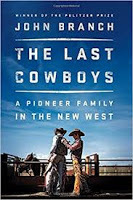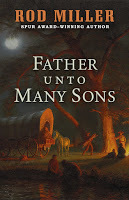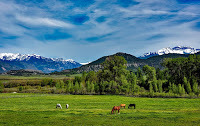Rod Miller's Blog, page 21
August 30, 2018
Ranching and rodeo with the Wrights.

Over the years I have had the pleasure of writing about the Wright family of Milford, Utah. You know the ones—the family with more saddle bronc riding success in rodeo than any other tribe has equaled, or even approached—or ever will.There’s a new book about the Wrights, written by New York Times journalist John Branch. It’s titled The Last Cowboys: A Pioneer Family in the New West. Over the course of a few years, Branch spent a good deal of time with members of the Wright family at home, at the family ranch on Smith Mesa, at grazing permits above Beaver, Utah, and goin’ down the road with the best batch of bronc riders in rodeo. It’s a well-written book that lays bare all the triumphs and tragedies in the family, and there are plenty of both. In a family of thirteen kids raised by a pair of hard-working parents, there is never a shortage of domestic dynamics. For one unfamiliar with ranch and rodeo life, the author does a pretty good job of capturing the ins and outs of the West; only a few odd expressions and descriptions betray his inexperience. Evelyn Wright, matriarch of the clan, a friend, and one of the finest women I know, tells me it is strange to read about your life and your family, and that she and her husband, Bill, found a few errors but nothing significant. After reading the book, you’ll be impressed with their bravery in allowing the reporter into their lives, knowing what would be revealed.The Last Cowboys is a fine book about a fine family surviving broken dreams, broken hearts, and broken bones.
Published on August 30, 2018 08:08
August 20, 2018
Lies They Tell Writers, Part 46: This would make a great movie!

If you’ve published a novel, chances are someone (perhaps yourself) has said it would make a great movie. Maybe it would. Yours, and probably hundreds of others.The thing is, there are a lot more books published than there are movies produced. A lot. Especially since digital publishing made it possible for anyone and everyone to get a book in print. The same is not true for movies. But while digital technology has changed movie making as much as it has publishing, it is still an expensive proposition, involving lots of talented people on both sides of the camera. And still, it is the people who have the money to make a movie who decide which movies get made, and it seldom has anything to do with the quality of the script.Even if someone decides to make a movie of your book, you may not recognize it when it’s finished. I once heard it equated to selling a house with a view. Someone with money likes it and buys it. Then they tear down your house and build their own house. It turns out it was the view—the idea, maybe, a character, or the plot—they liked, not your writing. But, it can happen. Your book just might become a major motion picture. It happened to my friend Thomas Cobb. Many years ago, he wrote a novel called Crazy Heart. Movie makers liked it. In fact, it was optioned about a dozen times, but nothing ever happened. Finally, another production company picked it up and Jeff Bridges won an Oscar for his starring role. Thomas has written several novels since, some of them are likely better than Crazy Heart. He’s not expecting to see any of them on the big screen. He describes his experience with Crazy Heart as “being struck by benevolent lightning.” And you know the old saying: lightning seldom strikes the same place twice.
Published on August 20, 2018 06:36
August 9, 2018
The birth of Father unto Many Sons.

Those who read this stuff regularly know that Father unto Many Sons is a novel. It was conceived on my computer. Gestated in the inner workings of Five Star Publishing. And now its birth is imminent. The delivery takes place Friday, August 24, at 7:00 p.m. at The Printed Garden, 9445 South Union Square, Suite A, in Sandy, Utah. It’s a fine bookshop, just a mile or two from where the book originated. If you’re within driving distance you are invited—nay, entreated, encouraged, urged—to attend the blessed event. It will be a multiple birth, and while it is difficult to say how many copies of Father unto Many Sons the stork will drop off, there will surely be enough for you to adopt and take one home for your own. Many of the new novel’s siblings will also be there looking for good homes.Put it on your calendar. Saddle up the horse. Hitch up the buggy. Gas up the car. Bring your friends and neighbors. See you at The Printed Garden, Friday, August 24, to welcome Father unto Many Sons into the world.
Published on August 09, 2018 11:11
August 2, 2018
Really Stupid Words, Chapter Three

American English is a rich language. It’s always changing and evolving. New words and usages come and go. Many that come along are helpful. They clarify, they improve, they enhance and enrich. But some are just plain stupid. They obfuscate, they complicate, they confuse. They reveal a lack of understanding. One of my favorites is “readjust.”Now there’s a word (if it is a word) with absolutely no reason for being. If something needs to be adjusted, you adjust it. If it needs doing again, you simply adjust it. You can adjust it again. Then you can adjust it some more, as often as need be. Adjust is somewhat related to “change.” You can change things repeatedly, but no one ever calls it “rechange.” Same with move. You can move things over and over. But if you “remove” them, that’s something else altogether. I am firmly against the use of “readjust.” And I will remain that way, unless or until I readjust my thinking.
Published on August 02, 2018 09:12
July 24, 2018
Happy Holiday!

Today, as I post this, is July 24. Here in Utah it’s a big day. Pioneer Day. A state holiday. Lots of folks who work for a living get the day off. There’s a big parade in downtown Salt Lake City and fireworks will light up the sky tonight at many places around the state.For some reason, Utah’s Pioneer Day holiday is confusing to a lot of people. Immigrants enjoy the day off, but can’t wrap their heads around the reason for it—well, lots of them know the why of it, but still don’t grasp why that why matters.It all started back in 1847 when Mormon leader Brigham Young’s wagon pulled into the Salt Lake Valley and he raised up from his sickbed and said this was the place the Mormons (having been chased out of New York, Ohio, Missouri, and Illinois) would settle. His declaration was no big surprise—some advance members of the expedition were already here plowing when Brother Brigham showed up—but he made it official. He hadn’t asked permission to settle here, either from the bands of Ute and Shoshoni and other Indians who frequented the area, or from Mexico, which held title, such as it was, to the place.But here the Mormons settled anyway, intending to form their own little nation with a theocratic-type government. But, much to their surprise, they soon ended up back in the United States in 1848 when the land was seized following the Mexican-American War. Commemorating the arrival of those Mormon pioneers in the Salt Lake Valley is the reason for all the hoopla. I don’t know why that’s so confusing. When I lived in Nevada, most of that state shut down for a day in late October to celebrate Nevada Day, commemorating statehood. (Nevada, by the way, was originally part of Utah before the federal government started slicing off chunks to make and add to the new state. The same thing happened with parts of Colorado and Wyoming, too. The Mormons originally claimed big chunks of California, Arizona, New Mexico, and Oregon as well, but the government never recognized that claim. It’s all covered in a chapter of my book, The Lost Frontier .)But never mind all that. Just have a happy holiday. We could all use an excuse to celebrate.
Published on July 24, 2018 06:12
July 14, 2018
My Favorite Book, Part 15.

Since the late nineteenth century, the American West has been an environmental battleground. At one extreme, rabid capitalists see the region as nothing more than a rich land to be exploited for personal gain, never mind the effects their profiteering has on the land and the people who live on it. At the other extreme are radicals who believe mankind has no place in the West; that it is best left to the elements and we humans should only be allowed to sneak in and take a peek every now and then, then leave. Most folks, as is usually the case, are sandwiched somewhere nearer the center of those extremes and look to achieve some kind of balance betwixt and between. Even then, viewpoints are fervent and disagreements intense. Although somewhat dated since its publication in 1971, Encounters with the Archdruid by John McPhee paints arguments between conservation and development in vivid colors. And, the fact is, the arguments have changed little since then—or ever.The book sets the views of David Brower, outdoorsman and long-time leader of the Sierra Club and the titular “Archdruid,” against three powerful men with contrasting views. One of the encounters lies outside the West, featuring a real estate developer on Hilton Head Island off the South Carolina coast. Another concerns mineral mining in remote areas, specifically in a wilderness location in the Cascade Range. The third, and most engaging for me, pits government dam builder Floyd Dominy against Brower during a float trip through the Grand Canyon.McPhee, a meticulous reporter and imaginative writer, allows each man to state his case during each encounter, and allows readers to take from the debates what they will. And, like all good art and literature, Encounters with the Archdruidasks a lot more questions than it answers.
Published on July 14, 2018 06:33
July 5, 2018
A Viewers Guide to Roadside Animals.

Few things—if anything—in life gave my Dad more pleasure than horses and cattle. He knew them well and worked them like few have the ability to do. But even when not working, you might find him out in the corral “messing” with the horses. You’d often find him horseback in the pasture, or sitting on the tailgate of the pickup truck, or on the tractor seat after winter feeding just watching his cows, long beyond his original reason for being there. When traveling, he always noticed cattle and horses in the pastures and on the open range flying past the windshield. He’d comment on how “slick” (or maybe “poor”) the cows looked, admire the growing calves, point out a well-made range bull, praise horses and colts.While not as practiced at it as Dad, it’s a practice I picked up from him. Our car often hears comments about grazing cattle, usually accompanied by regret that almost all of them nowadays are black. Sighting a herd of our favored Herefords gleaming red and white in the sun is a rare and precious thing. Were you with us, you’d also hear my mockery every time we pass one of those yellow diamond-shaped roadside signs warning of livestock grazing on open range—with a picture of a dairy cow on it. But, perhaps, my favorite remark concerning roadside animals is one I heard decades ago from a rodeo traveling pal; a comment that betrays a real love for the sport. Drive past horses in a pasture and Marlowe “Bird” Carroll would likely say, “You think those horses would buck?”I still wonder.
Published on July 05, 2018 09:08
June 26, 2018
Reporting on poetry.
Published on June 26, 2018 09:38
June 18, 2018
Lies They Tell Writers, Part 44: Editors Love Enthusiasm.

Once upon a time I wrote a short essay about passion—being passionate, following your passion, lack of passion being a fatal flaw, that sort of thing—rendering my opinion that the whole notion is overblown.It caused something of a stir. Some agreed with my ruminations, others did not. One reader (and fine writer) opined that passion was a prerequisite and that fire and enthusiasm for the work were important considerations for editors. Perhaps. And there’s certainly nothing wrong with being passionate about your writing if that’s what butters your biscuit. But it ain’t necessarily so.A reliable—but not precise—accounting of editors I have worked with includes some 15 or so with magazines and periodicals, at least two dozen on anthologies of short fiction or poetry, and somewhere north of 20 in the process of getting books, both fiction and nonfiction, into print. Some editors I have worked with on only one or a few occasions; several of them many, many times. None ever asked about, commented on, or required enthusiasm—passion—on my part.But I have absorbed a few notions about what seems to be widely regarded among the red pencil set. Here’s some of it.Good ideas are valuable. Not just ideas that are good on their own, but good ideas that fit the nature of the editor’s requirements. It should go without saying that they expect quality writing—well-structured and readable and all that, with a certain amount of flair. Research—when applicable—should be thorough and your facts should be straight; even fiction should feel credible. Your manuscripts should be clean; as free of typos as possible with proper grammar and punctuation and spelling and such. Finally, and probably most important, editors like reliability. If you meet deadlines, keep your promises, and do what you say you will—and are asked to—do, you’ll be doing everyone a favor. Including yourself and your career. If you’re passionate on top of all that, fine. But don’t plan on enthusiasm alone getting you through.Woody Allen is credited with this little bit of wisdom: “Eighty percent of success is showing up.” In the broader sense, that advice certainly applies to writing.
Published on June 18, 2018 07:49
June 7, 2018
Really Stupid Words, Chapter Two

American English is a rich language. It’s always changing and evolving. New words and usages come and go. Many that come along are helpful. They clarify, they improve, they enhance and enrich. But some are just plain stupid. They obfuscate, they complicate, they confuse. They reveal a lack of understanding. Think about “proactive.”I was surprised to learn that it has been around, in a limited way, for a long, long time. Fortunately, no one used it much until, say, 30 or so years ago. Since then, it has become one of the most overused words in our language. Not only in business circles, where made-up trendy buzzwords often find a home, but by regular folks, as well. It’s supposed to mean the opposite of “react” or “reactive.” Apparently, no one stops to think that those words are opposites of perfectly good words—act and active—so don’t really need an opposite themselves. If “active” doesn’t seem to fit, try “aggressive” or “concerted” or “determined” or “resolute” or “take the initiative.” We could go on. Whatever words you choose to describe an active approach to something, there’s no point, really, in resorting to a stupid, meaningless, but apparently important-sounding (to some) word such as “proactive.” Therefore, I will be proactive in my efforts to eliminate it.
Published on June 07, 2018 10:01




